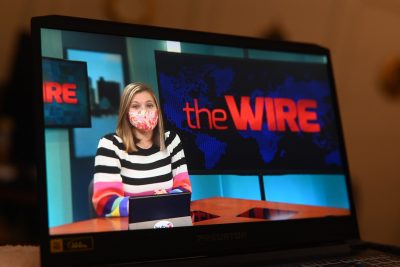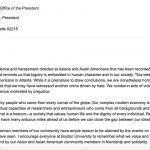
Those who have tuned in to BUTV10, Boston University’s television network, in the past several days may have noticed a difference: all anchors were wearing masks.
A new public health policy from BU’s Film and Television Department took effect Tuesday, requiring students both on camera and producing to wear masks at all times.
BUTV10’s faculty advisor Chris Cavalieri, a professor in the College of Communication, wrote in an email the change was made to ensure a safe and healthy production environment.
“At this juncture, the BUTV10 membership understands all the challenges and restrictions, including the revised mask policy put in place by COM,” Cavalieri wrote. “The students have moved beyond them and are focused and determined to produce the best work they can.”
BUTV10 General Manager Malaika Moyer, a senior in COM, said the mask policy will have more of a discernible impact on the network’s non-news shows.
Viewers can still hear the news regardless of anchors wearing masks, Moyer said, but in narrative television, audiences rely on facial expressions. Thus, she added, masks can impact a show’s storyline.
“They could just throw on masks and do the show as they planned,” Moyer said, “but being intentional is a really important thing in television, and I think producers have to adapt to that.”
Non-news shows are unable to film in commercial or open venues, and those who are not regularly tested for COVID-19 are barred from production. Moyer said shows such as the food-based “The Hungry Terrier” will suffer from the venue policy because it tends to film at restaurants.
“The Wire” Producer Alex Ross, a junior in COM, said the station communicated well with students before returning in Fall, which was a main reason she came back to campus.
Prior to the change late last month, Ross said, anchors would remove masks briefly to film segments and replace them immediately following filming.
But with cases rising in Massachusetts and at BU, Ross said she saw the change as a necessity for the show’s survival.
“That visual piece of things was very important to show that we’re still here,” Ross said. “We’re still making content. We’re still being journalists, but we’re doing it literally as safely as possible.”
“On That Point” producer Claudia Rosado, a senior in COM, said she was initially worried masks would decrease show quality.
“So much of being on air is projecting and talking to people,” Rosado said, “so when people can’t see the second half of your face, you basically lose a lot of expressions and communication.”
Rosado said she and her fellow anchors decided to be “a little more big with [their] gestures” to make up for the loss of facial expressions.
“The Wire” Producer Evan Jimenez, a sophomore in COM, said he understands the change in policy, but that it has caused minor nuisances.
Jimenez said having masks as part of the anchors’ attire means working them into the color palette and adjusting studio lighting accordingly. Sound quality has been affected, he added.
“Audio suffers a little bit,” Jimenez said, “because there’s literally cloth in front of your mouth.”
Jimenez said the network is doing its best despite the change.
“Overall, I think that the work we do as journalists is not affected: talking to people, writing stories, making sure that things are heard,” Jimenez said. “A mask doesn’t quite change that.”
While the mask mandate is a safety precaution more visible to viewers, Ross said the studio is also covered with room capacity signs and stickers showing where chairs should be located.
She said those working on “The Wire,” which films weekday mornings, wipe down all surfaces before and after filming.
“It’s on us to keep BUTV10 operating and to keep everything clean,” Ross said.
Despite restrictions, Moyer said she believes BUTV10’s work since summer began has been a hallmark of her time with the network.
“I really mean it when I say our producers have handled it with stride,” Moyer said. “They’re doing such an amazing job, and this content is the best I’ve seen in my four years here.”
Malaika Moyer was a photographer for The Daily Free Press during the Spring 2018 semester.















No real news network holds their employees to these standards. More pandemic theater from a university unwilling to put any effort into safeguarding its students’ mental wellbeing.